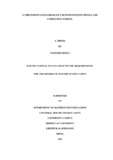Please use this identifier to cite or link to this item:
https://elibrary.tucl.edu.np/handle/123456789/1933| Title: | Achievement in Mathematics between Institutional and Community School |
| Authors: | Nepali, Santosh |
| Keywords: | Mathematics;Achievement tests;Community Schools |
| Issue Date: | 2016 |
| Publisher: | DEPARTMENT OF MATHEMATICS EDUCATION CENTRRAL DEPART OF EDUCATION UNIVERSITY CAMPUS TRIBHUVAN UNIVERSITY KIRTIPUR, KATHMANDU NEPAL |
| Abstract: | This study aimed to find out the achievement in mathematics, comparing the students' achievement in mathematics' among the secondary level students of community and institutional schools and seeking out the crucial factors that play roles in achievement gap of the students between these schools. The study is of survey design and 8 institutional and 8 community schools of Sindhuli district were selected by stratified random sampling and all together 320 students such that 20 students from each of these schools are selected as a sample. Students' studying at IX grade were considered as sample population of this research. The parents' education status, parents' occupational status, student regularity, class size, quality of teachers, tuition fees, family guidance, role of administration, extra-curricular activities were also considered as the supplementary primary data. The achievement test and a set of closed questionnaire were developed as the tools for data collection. The mathematics achievement were examined and were compared and set of closed questionnaire were filled up among 320 students. The statistical technique used in this study, were mean scores, standard deviation and two tailed z-test. Based on the interpretation and analysis of the data, it is found that the mathematics achievement score of institutional school students is higher than the community school students and concluded that there is significant difference between community and institutional school students in their achievement in mathematics. Also it is found that factors parents' education status, parents' occupation status, students' regularity, class size quality of teachers, tution fees, family guidance, role of administration and extra-curricular activities play an important role for the gap in mathematics achievement of institutional and community schools. |
| URI: | http://elibrary.tucl.edu.np/handle/123456789/1933 |
| Appears in Collections: | English Language Education |
Items in DSpace are protected by copyright, with all rights reserved, unless otherwise indicated.

